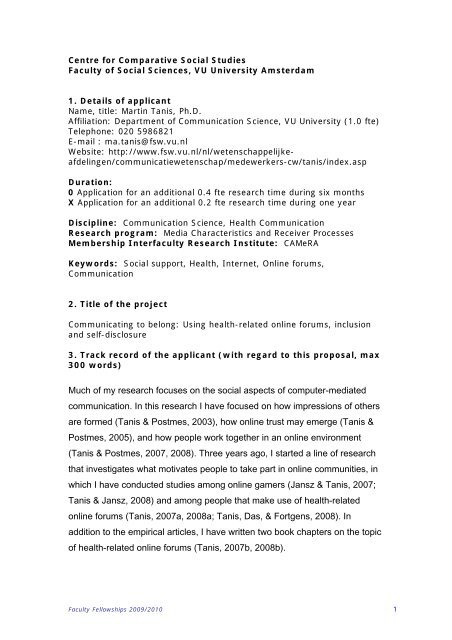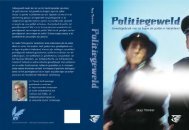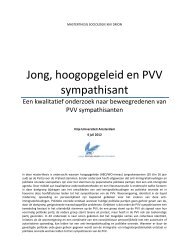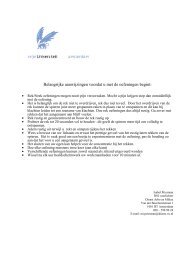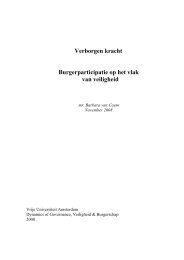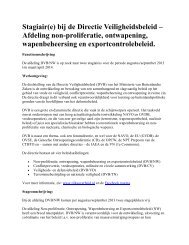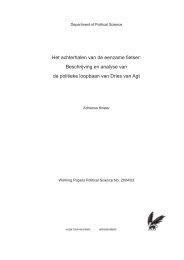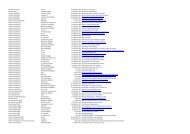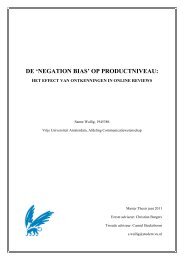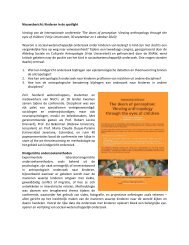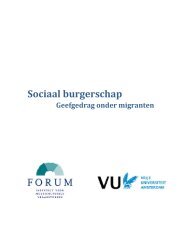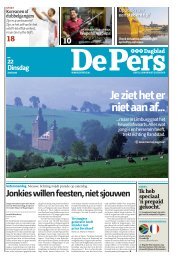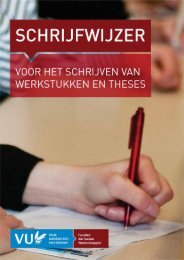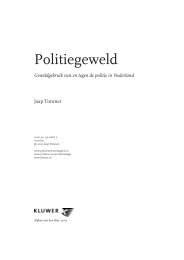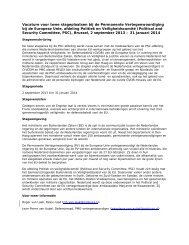Research proposal M. Tanis - Faculteit der Sociale Wetenschappen ...
Research proposal M. Tanis - Faculteit der Sociale Wetenschappen ...
Research proposal M. Tanis - Faculteit der Sociale Wetenschappen ...
You also want an ePaper? Increase the reach of your titles
YUMPU automatically turns print PDFs into web optimized ePapers that Google loves.
Centre for Comparative Social Studies<br />
Faculty of Social Sciences, VU University Amsterdam<br />
1. Details of applicant<br />
Name, title: Martin <strong>Tanis</strong>, Ph.D.<br />
Affiliation: Department of Communication Science, VU University (1.0 fte)<br />
Telephone: 020 5986821<br />
E-mail : ma.tanis@fsw.vu.nl<br />
Website: http://www.fsw.vu.nl/nl/wetenschappelijkeafdelingen/communicatiewetenschap/medewerkers-cw/tanis/index.asp<br />
Duration:<br />
0 Application for an additional 0.4 fte research time during six months<br />
X Application for an additional 0.2 fte research time during one year<br />
Discipline: Communication Science, Health Communication<br />
<strong>Research</strong> program: Media Characteristics and Receiver Processes<br />
Membership Interfaculty <strong>Research</strong> Institute: CAMeRA<br />
Keywords: Social support, Health, Internet, Online forums,<br />
Communication<br />
2. Title of the project<br />
Communicating to belong: Using health-related online forums, inclusion<br />
and self-disclosure<br />
3. Track record of the applicant (with regard to this <strong>proposal</strong>, max<br />
300 words)<br />
Much of my research focuses on the social aspects of computer-mediated<br />
communication. In this research I have focused on how impressions of others<br />
are formed (<strong>Tanis</strong> & Postmes, 2003), how online trust may emerge (<strong>Tanis</strong> &<br />
Postmes, 2005), and how people work together in an online environment<br />
(<strong>Tanis</strong> & Postmes, 2007, 2008). Three years ago, I started a line of research<br />
that investigates what motivates people to take part in online communities, in<br />
which I have conducted studies among online gamers (Jansz & <strong>Tanis</strong>, 2007;<br />
<strong>Tanis</strong> & Jansz, 2008) and among people that make use of health-related<br />
online forums (<strong>Tanis</strong>, 2007a, 2008a; <strong>Tanis</strong>, Das, & Fortgens, 2008). In<br />
addition to the empirical articles, I have written two book chapters on the topic<br />
of health-related online forums (<strong>Tanis</strong>, 2007b, 2008b).<br />
Faculty Fellowships 2009/2010 1
Most of these studies contained questionnaire data. I therefore have gained a<br />
lot of knowledge on designing questionnaires and analyzing the data. A recent<br />
experimental study (<strong>Tanis</strong> & Nijenhuis, 2008) included a content analysis of<br />
online postings of people that were socially ostracized. Through this study I<br />
have gained knowledge on content analysis of online postings, which is<br />
relevant in setting up the proposed study, and analyzing the results.<br />
This, in combination with my knowledge of communication science in general,<br />
and online behavior in specific, makes me the right person to conduct this<br />
study.<br />
Jansz, J., & <strong>Tanis</strong>, M. (2007). The appeal of playing online first person shooter games.<br />
Cyberpsychology & Behavior, 10(1), 133-136.<br />
<strong>Tanis</strong>, M. (2007a). Online lotgenotencontactgroepen: De aantrekkingkracht van steun via het<br />
internet. Psychologie en Gezondheid, 35(2), 234-242.<br />
<strong>Tanis</strong>, M. (2007b). Online social support groups. In A. Joinson, K. Y. A. McKenna, T. Postmes<br />
& U. D. Reips (Eds.), Oxford Handbook of Internet Psychology (pp. 139-153). Oxford,<br />
UK: Oxford University Press.<br />
<strong>Tanis</strong>, M. (2008a). Health-related online forums: What's the big attraction? Journal of Health<br />
Communication, 13(5), 5-23.<br />
<strong>Tanis</strong>, M. (2008b). What makes the internet a place to seek social support? In E. Konijn, S.<br />
Utz, M. <strong>Tanis</strong> & S. Barnes (Eds.), Mediated Interpersonal Communication (pp. 290-<br />
308): Lawrence Erlbaum Associates.<br />
<strong>Tanis</strong>, M., Das, E., & Fortgens, M. (2008). Wie zorgt er voor de mantelzorger? Effecten van<br />
online lotgenotencontactgroepen op de kwaliteit van leven van mensen die zorgen<br />
voor zieke an<strong>der</strong>en. Manuscript in progress<br />
<strong>Tanis</strong>, M., & Jansz, J. (2008). Gaming for different reasons: What motivates people to play a<br />
specific video game? Manuscript submitted for publication in Computers in Human<br />
Behavior.<br />
<strong>Tanis</strong>, M., & Nijenhuis, C. (2008). The talk of the excluded: How people talk about others<br />
online after being ostracized. Manuscript in progress<br />
<strong>Tanis</strong>, M., & Postmes, T. (2003). Social cues and impression formation in CMC. Journal of<br />
Communication, 53(4), 676-693.<br />
<strong>Tanis</strong>, M., & Postmes, T. (2005). A social identity approach to trust: Interpersonal perception,<br />
group membership and trusting behaviour. European Journal of Social Psychology,<br />
35, 413-424.<br />
<strong>Tanis</strong>, M., & Postmes, T. (2007). Two faces of anonymity: Paradoxical effects of cues to<br />
identity in CMC. Computers in Human Behavior, 23, 955-970.<br />
<strong>Tanis</strong>, M., & Postmes, T. (2008). Cues to identity in online collaboration: Interpersonal or<br />
intragroup perceptions in dyadic interactions. Group Dynamics, 12(2), 96-111.<br />
4. Proposal (4a + 4b + 4c = max 1000 words)<br />
4a. Problem statement and theoretical background<br />
Online social support groups are becoming increasingly popular for people<br />
that seek support in one way or the other. Many of these forums focus on<br />
health-related issues or psychological problems and prove to be very<br />
popular, especially when they address stigmatized conditions such as HIV,<br />
Faculty Fellowships 2009/2010 2
AIDS, eating disor<strong>der</strong>s or physical disabilities (Braithwaite, Waldron, &<br />
Finn, 1999; Preece & Ghozati, 2001).<br />
Despite the growing popularity of health-related online forums, there is<br />
relatively limited knowledge about how or why people use these social<br />
support groups instead of (or in addition to) offline support, and more<br />
importantly how participating affects the users (Alexan<strong>der</strong>, Wille, &<br />
Hollingshead, 1999; Braithwaite et al., 1999; Preece & Ghozati, 2001;<br />
Wright, 2002). Furthermore, the limited research that exists shows mixed<br />
results regarding health benefits (Eysenbach, Powell, Englesakis, Rizo, &<br />
Stern, 2004). A possible reason is that the bulk of research up to now is<br />
based on case studies in which the primary focus was on investigating<br />
how technical features of these forums have an effect on participation, or<br />
on the relation between participation and health-related effects on its<br />
users, without paying much attention to the human aspect (see:<br />
Eysenbach et al., 2004; <strong>Tanis</strong>, 2007b). These studies were for the most<br />
part conducted by people with either a technical (computer science) or<br />
medical interest, and as a result of that, not much attention has been<br />
devoted on the (inter)personal and social aspects of communicating in<br />
health-related forums.<br />
There is a compelling need for a more profound insight in these aspects in<br />
or<strong>der</strong> to provide us with a better un<strong>der</strong>standing of the effects these<br />
forums have on the everyday life of its users. This calls for studying this<br />
phenomenon from a communications perspective, with a strong focus on<br />
the impact of computer-mediated communication on (inter)personal and<br />
(inter)group processes (Rice & Katz, 2001). These insights provide<br />
valuable information that can be used to improve the design of these<br />
forums in specific, but also to be able make better judgements about the<br />
desirability of these forums in general.<br />
We know from literature that retrieving information is an important<br />
motivation for people to make use of health-related forums (see: <strong>Tanis</strong>,<br />
2007b for overview). Online support groups may be a valuable source of<br />
information because people can engage in interactions with others all over<br />
Faculty Fellowships 2009/2010 3
the world that potentially have un<strong>der</strong>standing of their specific situation.<br />
Thereby, online groups can provide individual members with support and<br />
advice from a forum of "experiential experts", unrestricted by<br />
geographical distance or time constraints (Braithwaite et al., 1999; Rice &<br />
Katz, 2001).<br />
There is, however, another interesting aspect to online support. The<br />
nature of support via Internet (which is essentially support from strangers<br />
located elsewhere) is illuminating with regard to debates about the<br />
functions of social support to well-being: Where effects of social support<br />
are often attributed to relational factors, or to physical aids, online social<br />
support may also have beneficial effects that are related to a sense of<br />
community itself (i.e. the realization that one is not alone out there)<br />
(<strong>Tanis</strong>, 2007b). This would fit well with emergent literatures charting close<br />
connections between a sense of social identity or community and well-<br />
being, and the function of such a sense of community as a buffer against<br />
the adverse effects of (social) stigma (Branscombe, Schmitt, & Harvey,<br />
1999; <strong>Tanis</strong>, 2007b, 2008a). This sense of community might explain why<br />
online groups are often characterized by high levels of self-disclosure<br />
(Joinson, 2001; Parks & Floyd, 1996; Swickert, Hittner, Harris, & Herring,<br />
2002). However, these assumptions have never been put to the test.<br />
The proposed project will address this shortcoming by investigating<br />
whether feelings of loneliness or stigmatization drive people to health-<br />
related forums in or<strong>der</strong> to find a sense of community and increased<br />
possibilities for self-disclosure, and how this affects their mental and<br />
physical well-being.<br />
4b. Approach<br />
The proposed study will test the assumption that people may make use of<br />
health-related forums because of the sense of community it affords them,<br />
and that this helps them to better cope with the situation they are facing.<br />
In or<strong>der</strong> to do so, the present research will adopt an approach that<br />
combines questionnaire data of forum users with a content analysis of<br />
Faculty Fellowships 2009/2010 4
their forum contributions, thereby linking reasons for participation and<br />
their effects on well-being with actual forum behavior.<br />
In addition to assessing a number of demographics and forum use<br />
measurements (time spent on forum, number of contributions on forum,<br />
etc., see: <strong>Tanis</strong>, 2008a), the questionnaire will consist of three variables<br />
investigating motives to join the online health-related forum and two<br />
variables measuring well-being. As suggested by literature, online support<br />
groups might be especially helpful for people that feel a lack of support<br />
from (offline) others, or are lonely or isolated because they feel<br />
stigmatized as a consequence of the situation they are facing (Davison,<br />
Pennebaker, & Dickerson, 2000; McKenna & Bargh, 1998; <strong>Tanis</strong>, 2007b).<br />
In or<strong>der</strong> to asses these variables, the questionnaire will include measures<br />
of the perceived amount of support people get from offline others (Zimet,<br />
Dahlem, Zimet, & Farley, 1988), the degree of perceived stigmatization<br />
(King et al., 2007), and loneliness (De Jong Gierveld & Van Tilburg,<br />
2006). Based on previous research (<strong>Tanis</strong> et al., 2008), well-being will be<br />
measured by making use of the SF12 scale (Ware, Kosinski, & Keller,<br />
1996) This scale allows for the measurement of peoples’ quality of life,<br />
both mentally as well as physically.<br />
To measure the online behavior of the respondents, this project will adopt<br />
an innovative approach by analyzing their actual online contributions,<br />
instead of making use of self-reports of this behavior. Such an approach<br />
reduces subjectivity bias, because it allows the researcher to assess actual<br />
behavior rather than the individuals’ perceptions of that behavior, which is<br />
especially relevant because people may not be aware of their own<br />
behavior. In or<strong>der</strong> to do so, respondents will be asked to paste in the<br />
online questionnaire the content of their last contribution to the forum<br />
(after removing identifying information). Even though this approach limits<br />
this study to investigating only one of their postings instead of their<br />
complete interactions, this approach is chosen to be able to combine a<br />
large amount of questionnaire data to the actual content of their online<br />
activities. The content of the contributions will be analyzed on two<br />
dimensions: markers that signal a sense of community, and markers that<br />
Faculty Fellowships 2009/2010 5
signal self-disclosure. Sense of community is for instance indicated by<br />
making use of words signaling group membership, such as “us” and “we”,<br />
or referring to people outside the community or people that do not face<br />
the same situation as “them” or “they” (see for more detailed description<br />
of using words to indicate group membership: Maass, Salvi, Arcuri, &<br />
Semin, 1989). Finally, self-disclosure is indicated by people reporting<br />
(undesirable) behavior or revealing other sorts of personal information<br />
(see: Joinson, 2001).<br />
With this approach, this study will test the following hypotheses:<br />
• H1: Feelings of loneliness or stigmatization will result in a stronger<br />
sense of community in the online health-related forum.<br />
• H2: Stronger sense of community will lead to more self-disclosure.<br />
• H3: Stronger sense of community and more self-disclosure will have a<br />
positive effect on well-being.<br />
4c. Outline of book or articles to be written<br />
Based on the results of the proposed research an article will be submitted<br />
to Human Communication <strong>Research</strong>, one of the leading journals in the<br />
field of communication science. Furthermore, the results will be presented<br />
at highly visible national (Etmaal van de Communicatiewetenschap) and<br />
international (International Communication Association) conferences.<br />
Finally, if time permits, time will be spent to write a <strong>proposal</strong> on the same<br />
topic in collaboration with Dr. E. Das (Department of Communication<br />
Science at the VU University Amsterdam) in or<strong>der</strong> to obtain funding for a<br />
PhD from the Netherlands Organization for Scientific <strong>Research</strong> (NWO).<br />
Faculty Fellowships 2009/2010 6
5. Time schedule (max ½ A4 or 100 words)<br />
The available time (0.2 fte = 320 hours) will be divided among the<br />
following activities:<br />
Activity: hours<br />
Searching / reading literature for (improved) scales 24 hours<br />
Developing online questionnaire 16 hours<br />
Selecting relevant online forums and apply for<br />
permission to post invitation to research<br />
16 hours<br />
Develop coding instructions 16 hours<br />
Recruit and train co<strong>der</strong>s 16 hours<br />
Code (part of) the data 24 hours<br />
Analyze interco<strong>der</strong> reliability and import data in dataset 8 hours<br />
Analyzing the data 32 hours<br />
Writing a journal article about Study 112 hours<br />
Writing a <strong>proposal</strong> for funding 56 hours<br />
6. Scientific relevance (max 200 words)<br />
The scientific relevance of this research is clear in that it provides us<br />
knowledge of a type of social behavior that is becoming increasingly<br />
popular (Rice, 2006), but of which our knowledge is limited. Results of<br />
this study can be used to better un<strong>der</strong>stand what it is that motivates<br />
people to take part in (health-related) online forums, how they do that,<br />
and how this affects both mental and physical well-being.<br />
In addition to increased knowledge about these forums, this study also<br />
contributes to what we know about language use and how we can use this<br />
to tap social behavior. Even though there are a few other studies that use<br />
content analysis to measure sense of community (Maass et al., 1989) and<br />
self-disclosure (Joinson, 2001), more research using this approach is<br />
needed.<br />
Faculty Fellowships 2009/2010 7
Finally, linking questionnaire data to content analysis is an innovative<br />
approach, which contributes to the diversity of research methods used in<br />
social sciences.<br />
7. Expected output and contributions (7a – 7c = max 500 words)<br />
7a. Expected output<br />
The output will consist of a journal article for Human Communication<br />
<strong>Research</strong>, a high-impact journal in the field of communication science. In<br />
addition to that, results will be presented at the “Etmaal van de<br />
Communicatiewetenschap” and the annual conference of the<br />
“International Communication Association”. Results of this study will be<br />
used to prepare a <strong>proposal</strong> on the same topic in collaboration with Dr. E.<br />
Das (Department of Communication Science at the VU University<br />
Amsterdam) in or<strong>der</strong> to obtain funding for a PhD for the Open Competition<br />
from the Netherlands Organization for Scientific <strong>Research</strong> (NWO).<br />
7b. Contribution to the research program of the Department and –<br />
if applicable – the Interfaculty <strong>Research</strong> Institute in which the<br />
applicant takes part<br />
The program of the Department of Communication Science focuses on two<br />
aspects of communication: message characteristics and receiver<br />
processes. In this program there is a strong focus on why people choose<br />
to make use of a specific medium, and what influences these uses may<br />
have on them. Also, research on new media is one of the focal points in<br />
our department. Furthermore, this project is in line with the prevailing<br />
scientific approach of the department in that it is theory-driven and<br />
problem-oriented, with a clear societal value. Furthermore, the <strong>proposal</strong><br />
uses mixed-methods in the form of both content analysis and survey<br />
techniques. Finally, the research fits well in the new Center for Advanced<br />
Media <strong>Research</strong> Amsterdam (CAMeRA), that has the effects of new media<br />
on well-being as one of its focal points of research.<br />
Faculty Fellowships 2009/2010 8
7c. Added value<br />
The proposed project is time-consuming because in addition to designing<br />
and analyzing the questionnaire-data a lot of time will have to be spent on<br />
developing coding instructions, training the co<strong>der</strong>s and the coding itself.<br />
In addition, a consi<strong>der</strong>able amount of time is needed to write an article<br />
and a <strong>proposal</strong> to obtain funding for a PhD from the Netherlands<br />
Organization for Scientific <strong>Research</strong> (NWO). Because of the teaching-load<br />
of the applicant, the administrative tasks for the department, as well as<br />
the hours needed for other ongoing research projects, time for the<br />
proposed research project is currently not available.<br />
8. Replacement of applicant’s teaching obligations<br />
Replacement of the applicant’s teaching obligations is stated in the<br />
attached letter by the Head of the Department in Appendix A.<br />
9. Applicant’s CV<br />
(including publication record)<br />
Please submit CV in Appendix B.<br />
10. I hereby declare that I have completed this form truthfully:<br />
Name:<br />
Amsterdam, Date:<br />
11. Bibliography (max 1 A4)<br />
Alexan<strong>der</strong>, S. C., Wille, J. L., & Hollingshead, A. B. (1999). Help at your keyboard: Support<br />
groups on the Internet. In L. R. Frey (Ed.), Group communication in context: Studies<br />
of bona fide groups (2nd ed.). Mahwah, NJ: Lawrence Erlbaum Associates.<br />
Braithwaite, D. O., Waldron, V. R., & Finn, J. (1999). Communication of social support in<br />
computer-mediated groups for people with disabilities. Health Communication, 11,<br />
123-151.<br />
Branscombe, N. R., Schmitt, M. T., & Harvey, R. D. (1999). Perceiving pervasive<br />
discrimination among African Americans: Implications for group identification and<br />
well-being. Journal of Personality and Social Psychology, 77, 135-149.<br />
Davison, K. P., Pennebaker, J. W., & Dickerson, S. S. (2000). Who talks: The social<br />
psychology of illness support groups. American Psychologist, 55(2), 205-217.<br />
De Jong Gierveld, J., & Van Tilburg, T. (2006). A 6-Item scale for overall, emotional, and<br />
social loneliness confirmatory tests on survey data. <strong>Research</strong> on Aging, 28(5), 582-<br />
598.<br />
Faculty Fellowships 2009/2010 9
Eysenbach, G., Powell, J., Englesakis, M., Rizo, C., & Stern, A. (2004). Health related virtual<br />
communities and electronic support groups: systematic review of the effects of online<br />
peer to peer interactions. British Medical Journal, 328(7449), 1166-1170A.<br />
Joinson, A. N. (2001). Self-disclosure in computer-mediated communication: The role of selfawareness<br />
and visual anonymity. European Journal of Social Psychology, 31, 177-<br />
192.<br />
King, M., Dinos, S., Shaw, J., Watson, R., Stevens, S., Passetti, F., et al. (2007). The stigma<br />
scale: Development of a standardized measure of the stigma of mental illness. British<br />
Journal of Psychiatry, 190, 248-254.<br />
Maass, A., Salvi, D., Arcuri, L., & Semin, G. R. (1989). Language Use in intergroup contexts:<br />
The linguistic intergroup bias. Journal of Personality and Social Psychology, 57, 981-<br />
993.<br />
McKenna, K. Y. A., & Bargh, J. A. (1998). Coming out in the age of the Internet: Identity<br />
"demarginalization" through virtual group participation. Journal of Personality and<br />
Social Psychology, 75(3), 681-694.<br />
Parks, M., R., & Floyd, K. (1996). Making friends in cyberspace. Journal of Communication,<br />
46(1), 80-97.<br />
Preece, J. J., & Ghozati, K. (2001). Experiencing empathy on-line. In R. E. Rice & E. Katz<br />
(Eds.), The Internet and health communication: Experiences and expectations (pp.<br />
237-260). Thousand Oaks, CA: Sage.<br />
Rice, R. E. (2006). Influences, usage, and outcomes of Internet health information searching:<br />
Multivariate results from the Pew surveys. International Journal of Medical<br />
Informatics, 75(1), 8-28.<br />
Rice, R. E., & Katz, J. E. (2001). The internet and health communication: Experiences and<br />
expectations. Thousand Oaks, CA: Sage.<br />
Swickert, R. J., Hittner, J. B., Harris, J. L., & Herring, J. A. (2002). Relationships among<br />
Internet use, personality, and social support. Computers in Human Behavior, 18(4),<br />
437-451.<br />
<strong>Tanis</strong>, M. (2007a). Online lotgenotencontactgroepen: De aantrekkingkracht van steun via het<br />
internet. Psychologie en Gezondheid, 35(2), 234-242.<br />
<strong>Tanis</strong>, M. (2007b). Online social support groups. In A. Joinson, K. Y. A. McKenna, T. Postmes<br />
& U. D. Reips (Eds.), Oxford Handbook of Internet Psychology (pp. 139-153). Oxford,<br />
UK: Oxford University Press.<br />
<strong>Tanis</strong>, M. (2008a). Health-Related Online Forums: What's the Big Attraction. Journal of Health<br />
Communication, 13(5), 5-23.<br />
<strong>Tanis</strong>, M., Das, E., & Fortgens, M. (2008). Wie zorgt er voor de mantelzorger? Effecten van<br />
online lotgenotencontactgroepen op de kwaliteit van leven van mensen die zorgen<br />
voor zieke an<strong>der</strong>en. Manuscript in progress<br />
<strong>Tanis</strong>, M., & Nijenhuis, C. (2008). The talk of the excluded: How people talk about others<br />
online after being ostracized. Manuscript in progress<br />
Ware, J., Kosinski, M., & Keller, S. D. (1996). A 12-item short-form health survey:<br />
Construction of scales and preliminary test of reliability and validity. Med Care, 34,<br />
220-233.<br />
Wright, K. (2002). Social support within an on-line cancer community: An assessment of<br />
emotional support, perceptions of advantages and disadvantages, and motives for<br />
using the community from a communication perspective. Journal of Applied<br />
Communication <strong>Research</strong>, 30(3), 195-209.<br />
Zimet, G. D., Dahlem, N. W., Zimet, S. G., & Farley, G. K. (1988). The Multidimensional Scale<br />
of Perceived Social Support. Journal of Personality Assessment, 52, 30-41.<br />
Faculty Fellowships 2009/2010 10
Appendix B: CV of applicant<br />
Martin <strong>Tanis</strong><br />
Curriculum Vitae<br />
Work: Home:<br />
Department of Communication Science Bennebroekstraat 25 - 2<br />
VU University, Amsterdam 1058 LK Amsterdam<br />
De Boelelaan 1081 The Netherlands<br />
1081 HV Amsterdam t: 020 - 6841456<br />
The Netherlands<br />
t: 020 - 444 6825<br />
f: 020 – 444 6820<br />
e: ma.tanis@fsw.vu.nl<br />
Academic positions<br />
August 2004 – present: Assistant Professor Vrije Universiteit, department of<br />
Communication Science<br />
March 2003 – August 2004: Assistant Professor University of Amsterdam, department of<br />
Communication Science<br />
Sept. 1999 - March 2003: Part-time lecturer University of Amsterdam, department of<br />
Communication Science, UvA<br />
Education<br />
Oct. 1998 - March 2003: PhD-student at the Amsterdam School of<br />
Communications <strong>Research</strong> ASCoR, University of Amsterdam<br />
Sept. 1993 - Sept. 1998: Ma Communication Science, University of Amsterdam<br />
Journal Publications<br />
<strong>Tanis</strong>, M. (2008). Health-Related Online Forums: What's the Big Attraction. Journal of<br />
Health Communication, 13(5), 5-23.<br />
<strong>Tanis</strong>, M., & Postmes, T. (2008). Cues to identity in online collaboration: Interpersonal<br />
or intragroup perceptions in dyadic interactions. Group Dynamics, 12(2), 96-111..<br />
<strong>Tanis</strong>, M., & Postmes, T. (2007). Two faces of anonymity: Paradoxical effects of cues<br />
to identity in CMC. Computers in Human Behavior, 23, 955-970.<br />
Jansz, J., & <strong>Tanis</strong>, M. (2007). The appeal of playing online first person shooter<br />
games. Cyberpsychology & Behavior, 10(1), 133-136.<br />
<strong>Tanis</strong>, M., & Postmes, T. (2005). A social identity approach to trust: Interpersonal<br />
perception, group membership and trusting behaviour. European Journal of Social<br />
Psychology, 35, 413-424.<br />
<strong>Tanis</strong>, M., & Postmes, T. (2003). Social cues and impression formation in CMC.<br />
Journal of Communication, 53(4), 676-693.<br />
Postmes, T. & <strong>Tanis</strong>, M., & de Wit, B. (2001). Communication and commitment in<br />
organizations: A social identity approach. Group Processes & Intergroup Relations, 4(3). 227-<br />
246.<br />
Book (chapters)<br />
Konijn, E., Utz, S., <strong>Tanis</strong>, M., & Barnes, S. (2008). Mediated Interpersonal<br />
Communication: Routledge, Taylor and Francis Group.<br />
Konijn, E., Utz, S., <strong>Tanis</strong>, M., & Barnes, S. (2008). New Technology as Relationship<br />
Enabler. In E. Konijn, S. Utz, M. <strong>Tanis</strong> & S. Barnes (Eds.), Mediated Interpersonal<br />
Communication (pp. 3-13). Routledge, Taylor and Francis Group.<br />
<strong>Tanis</strong>, M. (2008). What makes the internet a place to seek social support? In E.<br />
Konijn, S. Utz, M. <strong>Tanis</strong> & S. Barnes (Eds.), Mediated Interpersonal Communication (pp. 290-<br />
308). Routledge, Taylor and Francis Group.<br />
Faculty Fellowships 2009/2010 11
<strong>Tanis</strong>, M. (2007). Online Social Support Groups. In A. Joinson, K. Y. A. McKenna, T.<br />
Postmes & U. D. Reips (Eds.), Oxford Handbook of Internet Psychology (pp. 137-152).<br />
Oxford, UK: Oxford University Press.<br />
<strong>Tanis</strong>, M. (2003). Cues to identity in CMC: The impact on person perception and<br />
subsequent interaction outcomes. Dissertation, University of Amsterdam, Amsterdam.<br />
Dutch Publications<br />
<strong>Tanis</strong>, M. (2007). Online lotgenotencontactgroepen: De aantrekkingkracht van steun<br />
via Internet. Psychologie en Gezondheid, 35(5) 234-242.<br />
<strong>Tanis</strong>, M., & Postmes, T. (2003). Effecten van persoonlijke cues en<br />
groepslidmaatschap op de ontwikkeling van vertrouwen. In E. v. Dijk, E. Kluwer & D.<br />
Wigboldus (Eds.), Jaarboek <strong>Sociale</strong> Psychologie 2002 (pp. 305-312). Delft: Eburon.<br />
<strong>Tanis</strong>, M., & Postmes, T. (2000). Effecten van individuatie in CMC. Tijdschrift voor<br />
Communicatiewetenschap, 28. 396-409.<br />
Forthcoming<br />
Buijzen, M., Rozendaal, E., Moorman, M., & <strong>Tanis</strong>, M. (in press). Parent vs. child<br />
reports of parental advertising mediation: Exploring the meaning of agreement. Journal of<br />
Broadcasting & Electronic Media.<br />
Teaching activities<br />
2004 – present: Seminar Media Genres and Media Use (Vrije Universiteit, dep. of<br />
Communication Science)<br />
2004 – present: Seminar Communication in Organizations (Vrije Universiteit, dep. of<br />
Communication Science)<br />
2004 – present: Supervising MA – theses (Vrije Universiteit, dep. of Communication Science)<br />
2004 – present: Supervising BA – theses (Vrije Universiteit, dep. of Communication Science)<br />
1999- 2004: Supervising MA – theses (University of Amsterdam, dep. of Communication<br />
Science)<br />
2003 – 2004: Seminar Intercultural Communication (University of Amsterdam, dep. of<br />
Communication Science)<br />
2002: Seminar practical skills in communication science “Internet and its Users”<br />
(University of Amsterdam, dep. of Communication Science)<br />
2000 – 2004: Seminar Social Processes and Information and Communication Technology<br />
(University of Amsterdam, dep. of Communication Science)<br />
1999: Seminar Organizational Communication (University of Amsterdam, dep. of<br />
Communication Science)<br />
Other academic activities<br />
Member<br />
- Educational committee, department of Communication Science, UvA (June 2008 – present)<br />
- Exam commitee, VU University (August 2007 – present)<br />
- Works council of faculty of social sciences, VU University (October 2004 – 2008)<br />
- Educational committee, department of Communication Science, UvA (June 2003 – August<br />
2004)<br />
- Committee on implementation of Bachelar – Master structure, UvA (January 2002 – July<br />
2003)<br />
Reviewer for following outlets:<br />
- New Media & Society / Corporate Communications / Media Psychology / Oxford Handbook<br />
of Internet Psychology / International Communication Association (various divisions) /<br />
Personal Relationships / Computers in Human Behavior / Management Communication<br />
Quarterly / Jaarboek <strong>Sociale</strong> Psychologie / Tijdschrift voor Communicatiewetenschap<br />
Faculty Fellowships 2009/2010 12


